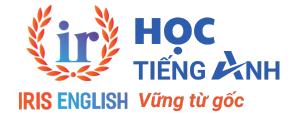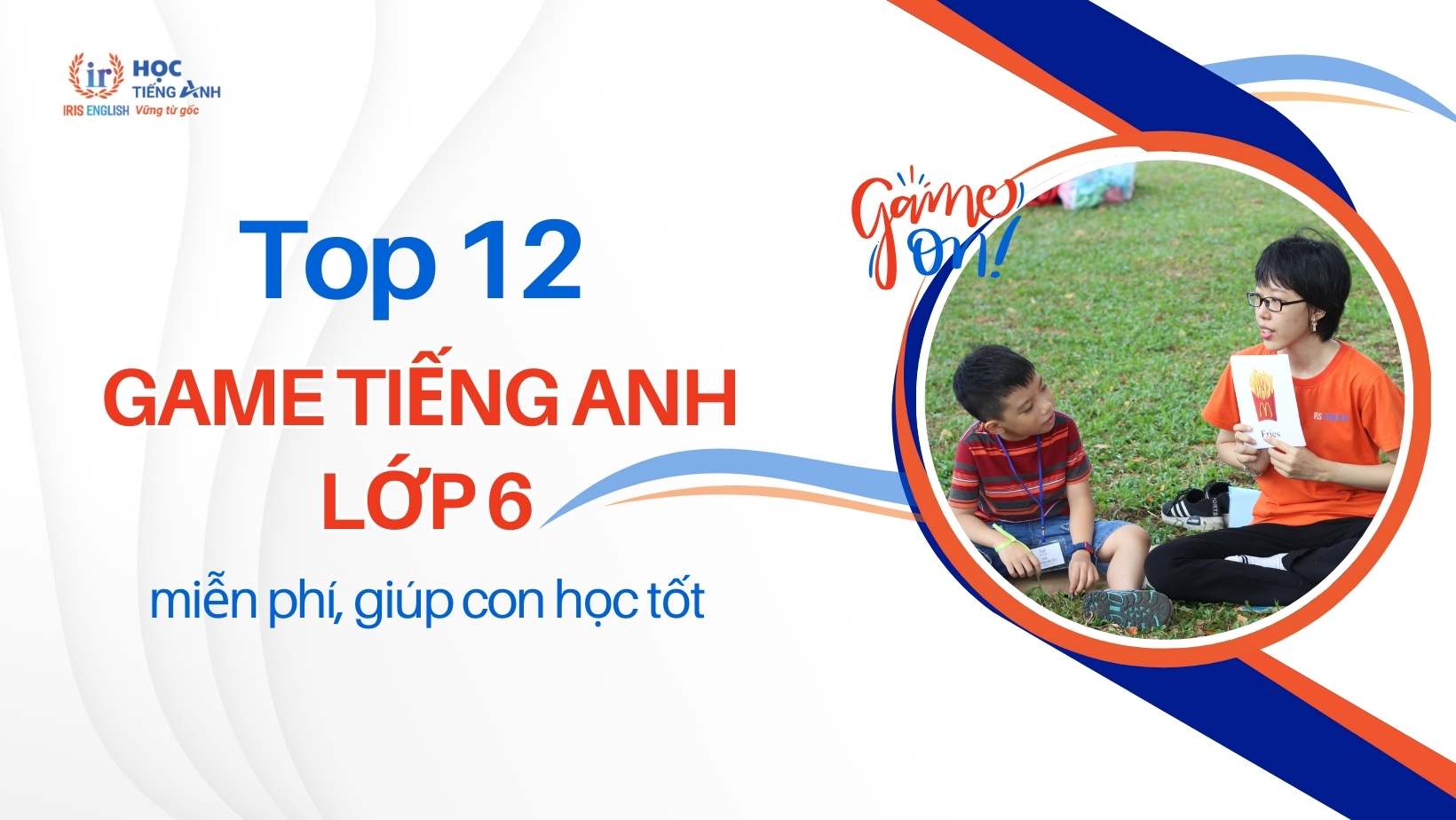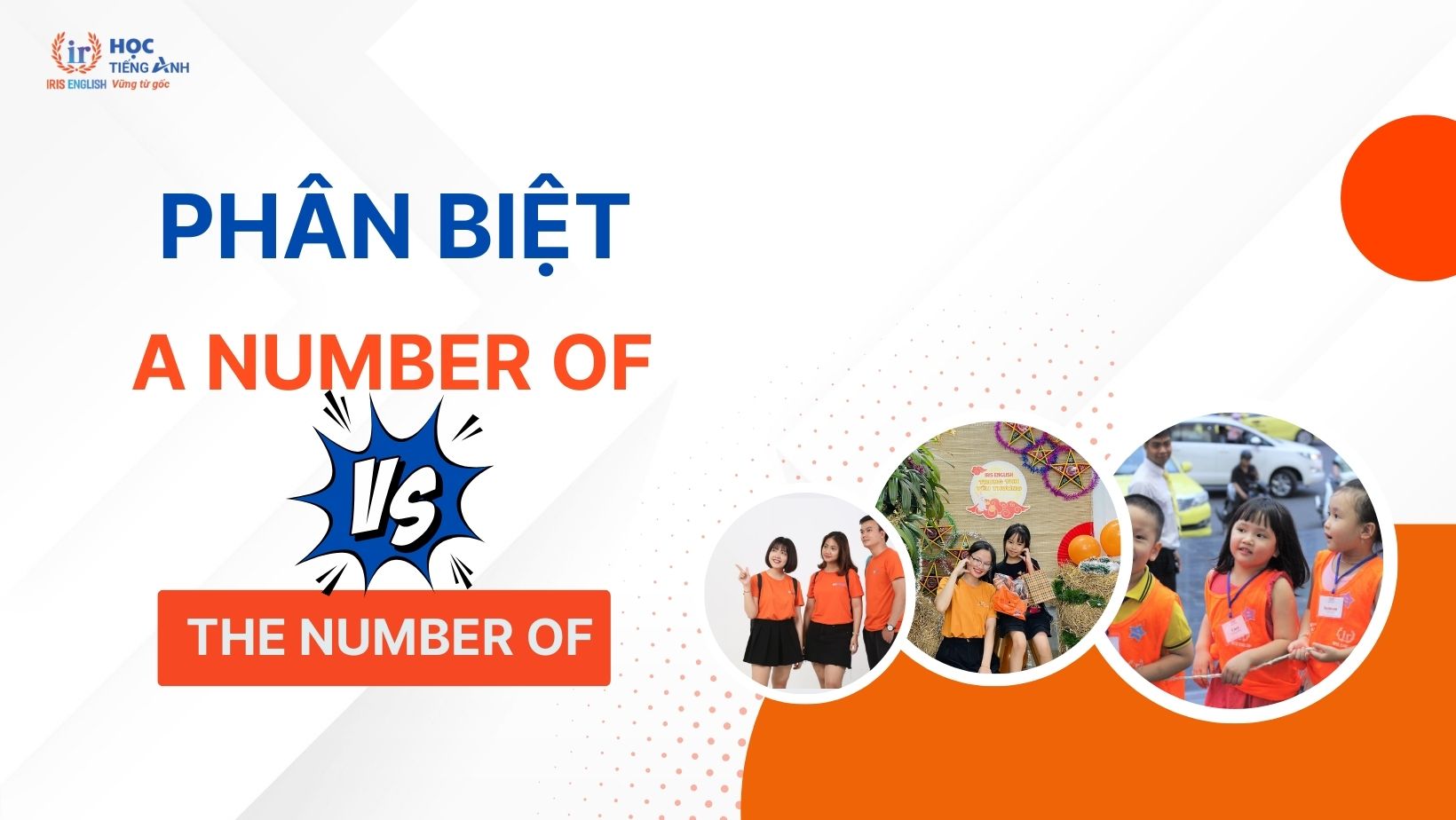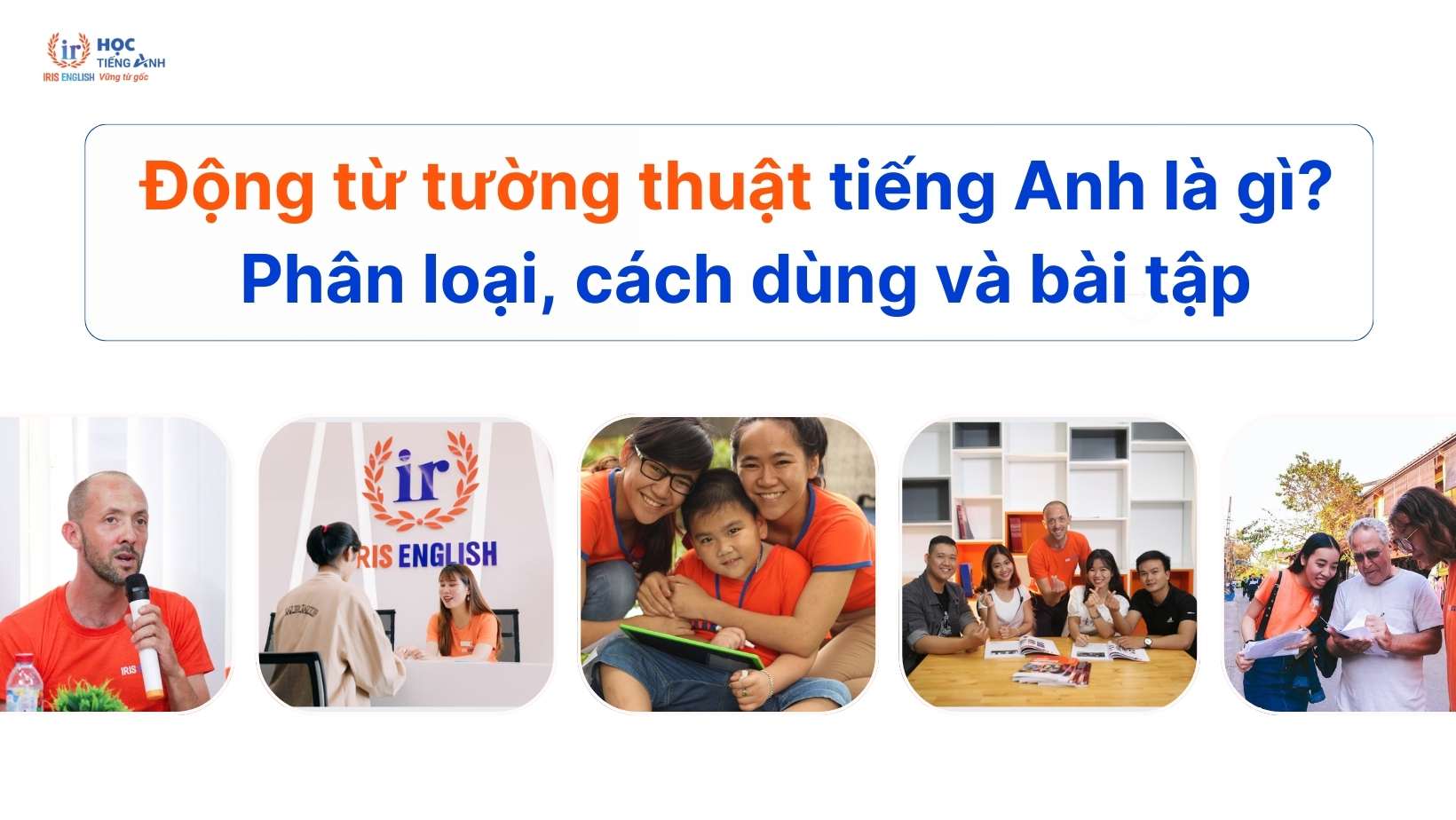Bài tập câu gián tiếp là một trong những nội dung ngữ pháp quan trọng giúp bạn cải thiện kỹ năng diễn đạt trong tiếng Anh. Không chỉ giúp bạn nắm vững cấu trúc câu, dạng bài tập này còn mang lại cơ hội thực hành tư duy ngôn ngữ linh hoạt hơn. Hãy khám phá ngay để biến những kiến thức lý thuyết thành công cụ giao tiếp hiệu quả!
Lý Thuyết Về Câu Gián Tiếp
Câu gián tiếp là gì?
Câu gián tiếp (Indirect Speech) là cách truyền đạt lại lời nói, suy nghĩ hoặc câu hỏi của người khác mà không lặp lại nguyên văn. Thay vì dùng dấu ngoặc kép và giữ nguyên lời nói, người nói sẽ điều chỉnh câu từ, thì của động từ và đại từ sao cho phù hợp với ngữ cảnh.
Ví dụ: Câu trực tiếp: She said, “I am tired” → Câu gián tiếp: She said that she was tired.
Các quy tắc chung khi chuyển từ câu trực tiếp sang câu gián tiếp
Dưới đây là các quy tắc quan trọng khi chuyển đổi câu trực tiếp sang câu gián tiếp, bao gồm thay đổi thì động từ, đại từ, trạng từ chỉ thời gian và địa điểm.
-
Thay Đổi Thì Động Từ
Khi động từ tường thuật ở thì quá khứ, thì của câu trực tiếp sẽ lùi một thì trong câu gián tiếp.
| Thì Trong Câu Trực Tiếp | Thì Trong Câu Gián Tiếp | Ví Dụ |
| Hiện tại đơn | Quá khứ đơn | She said: “I like chocolate.” → She said she liked chocolate. |
| Hiện tại tiếp diễn | Quá khứ tiếp diễn | He said: “I am reading a book.” → He said he was reading a book. |
| Hiện tại hoàn thành | Quá khứ hoàn thành | She said: “I have finished my homework.” → She said she had finished her homework. |
| Quá khứ đơn | Quá khứ hoàn thành | He said: “I saw her yesterday.” → He said he had seen her the day before. |
| Quá khứ tiếp diễn | Quá khứ hoàn thành tiếp diễn | She said: “I was cooking dinner.” → She said she had been cooking dinner. |
| Tương lai đơn | Tương lai trong quá khứ (would + V) | He said: “I will call you later.” → He said he would call me later. |
Lưu ý:
-
Nếu động từ tường thuật ở thì hiện tại (e.g., She says), không cần lùi thì.
-
Những sự thật hiển nhiên, quy luật tự nhiên không cần lùi thì: She said: “The Earth is round.” → She said the Earth is round.
-
Thay Đổi Đại Từ
Đại từ sẽ được thay đổi để phù hợp với ngữ cảnh của người nói và người nghe.
| Câu Trực Tiếp | Câu Gián Tiếp |
| “I” → “He/She” | She said: “I am tired.” → She said she was tired. |
| “We” → “They” | They said: “We are happy.” → They said they were happy. |
| “My” → “His/Her” | He said: “This is my car.” → He said that was his car. |
| “Our” → “Their” | She said: “That is our house.” → She said that was their house. |
-
Thay Đổi Trạng Từ Chỉ Thời Gian và Địa Điểm
| Câu Trực Tiếp | Câu Gián Tiếp |
| Now → Then | She said: “I am busy now.” → She said she was busy then. |
| Today → That day | He said: “I will meet her today.” → He said he would meet her that day. |
| Yesterday → The day before | She said: “I saw him yesterday.” → She said she had seen him the day before. |
| Tomorrow → The next day / The following day | He said: “I will go tomorrow.” → He said he would go the next day. |
| Here → There | She said: “I am here.” → She said she was there. |
| This → That | He said: “This is my book.” → He said that was his book. |
| These → Those | She said: “These are my friends.” → She said those were her friends. |
-
Cấu Trúc Câu Hỏi
-
Câu hỏi Yes/No: Sử dụng if hoặc whether. Ex: She asked: “Are you coming?” → She asked if I was coming.
-
Câu hỏi Wh-: Giữ nguyên từ để hỏi (what, where, when, why, how). Ex: He asked: “Where do you live?” → He asked where I lived.
-
Lưu Ý Quan Trọng
-
Mệnh lệnh: Sử dụng to + V:
-
He said: “Close the door.” → He told me to close the door.
-
She said: “Don’t talk!” → She told me not to talk.
-
-
Câu cảm thán: Biến đổi theo ngữ nghĩa:
-
She said: “What a beautiful day!” → She said it was a beautiful day.
-
Các dạng câu gián tiếp phổ biến
-
Câu Tường Thuật
Dùng để kể lại lời nói, suy nghĩ hoặc quan điểm của người khác.
Cấu trúc:
S + said (that) + S + V (lùi thì nếu cần).Ví dụ: She said, “I like apples.” → She said (that) she liked apples.
-
Câu Hỏi Yes/No
Chuyển câu hỏi có/không sang câu gián tiếp, sử dụng if hoặc whether.
Cấu trúc:
S + asked + if/whether + S + V (lùi thì nếu cần).Ví dụ: He asked, “Do you like pizza?” → He asked if I liked pizza.
-
Câu Hỏi Wh-
Dùng để hỏi thông tin cụ thể, giữ nguyên từ để hỏi (wh-word) và lùi thì nếu cần.
Cấu trúc:
S + asked + wh-word + S + V (lùi thì nếu cần).Ví dụ: She asked, “Where do you live?” → She asked where I lived.
-
Câu Gián Tiếp Với Động Từ Nguyên Mẫu
Sử dụng để tường thuật lại mệnh lệnh hoặc yêu cầu.
Cấu trúc:
S + told/asked + O + to V (khẳng định).
S + told/asked + O + not to V (phủ định).Ví dụ:
-
He told me, “Close the door.” → He told me to close the door.
-
She said, “Don’t talk!” → She told me not to talk.
-
Câu Gián Tiếp Với Gerund
Sử dụng khi tường thuật lại sự thừa nhận, phủ nhận, hoặc mô tả hành động liên quan đến việc đã xảy ra.
Cấu trúc:
S + admitted/denied + V-ing.Ví dụ: She said, “I love painting.” → She admitted loving painting.
-
Câu Cảm Thán
Dùng để tường thuật lại những lời cảm thán hoặc biểu lộ cảm xúc.
Cấu trúc:
S + exclaimed/said + (that) + S + V.Ví dụ: She said, “What a beautiful day!” → She exclaimed that it was a beautiful day.
-
Câu Điều Kiện Gián Tiếp
Dùng để chuyển các câu điều kiện sang câu gián tiếp.
Cấu trúc: Loại 1: Lùi thì về quá khứ đơn. Loại 2 & 3: Giữ nguyên thì vì chúng đã ở thì quá khứ.
-
Câu Gián Tiếp Với Các Động Từ Đặc Biệt
Một số động từ khác thường dùng trong câu gián tiếp:
-
Promise (hứa): She said, “I will help you.” → She promised to help me.
-
Advise (khuyên): He said, “You should rest more.” → He advised me to rest more.
-
Warn (cảnh báo): She said, “Don’t touch that wire.” → She warned me not to touch that wire.
Những Lỗi Thường Gặp Khi Làm Bài Tập Câu Gián Tiếp
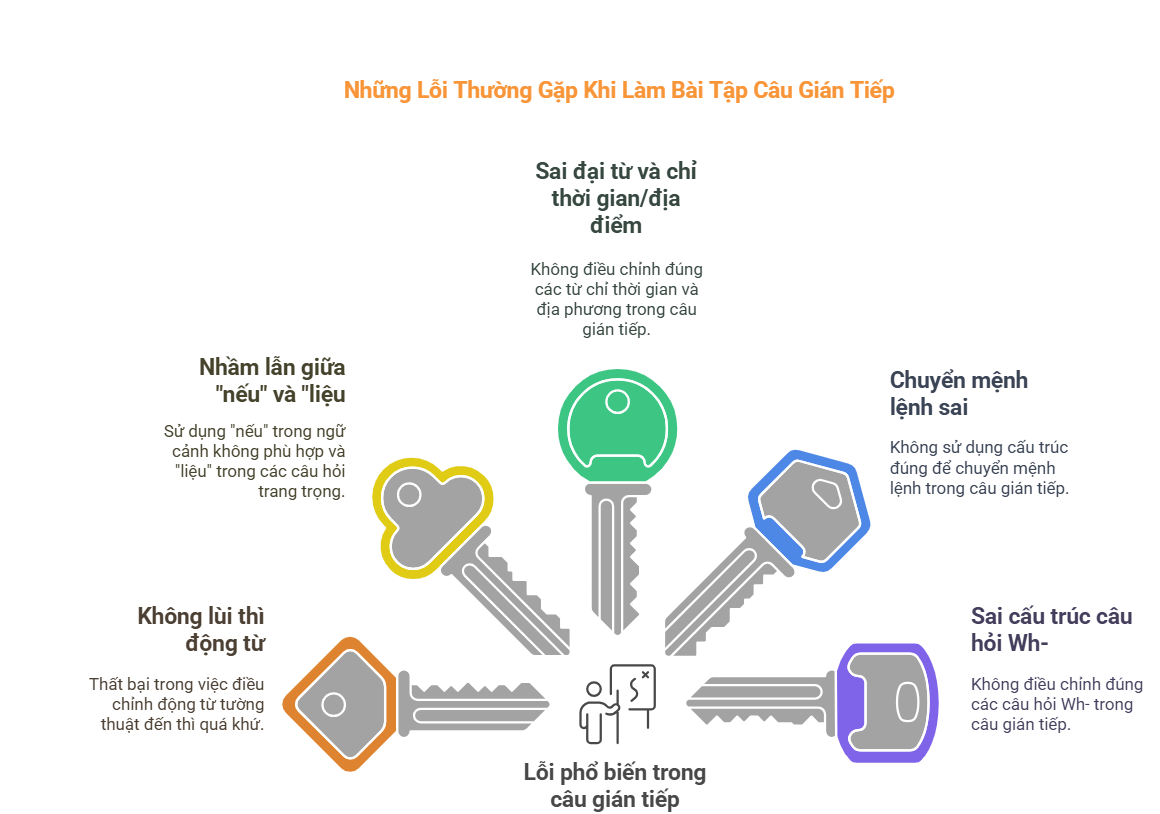
-
Không lùi thì động từ: Quên lùi thì khi động từ tường thuật ở thì quá khứ. Ví dụ: He said, “I am happy.” → He said he was happy.
-
Nhầm giữa “if” và “whether”: Dùng sai “if” và “whether” trong câu hỏi Yes/No. If dùng trong ngữ cảnh thông thường, whether dùng để chỉ sự lựa chọn hoặc trong câu trang trọng.
-
Sử dụng sai đại từ và trạng từ chỉ thời gian/địa điểm: Quên thay đổi “now”, “today”, “here”,… theo ngữ cảnh. Ví dụ: He said, “I will meet you here tomorrow.” → He said he would meet me there the next day.
-
Giữ nguyên đại từ mà không thay đổi: Quên điều chỉnh “I”, “you”, “we”,… phù hợp với người nói/người nghe. Ví dụ: She said, “I will help you.” → She said she would help me.
-
Chuyển sai mệnh lệnh và yêu cầu: Không dùng “to V” hoặc “not to V”. Ví dụ: He said, “Close the door.” → He told me to close the door.
-
Sai cấu trúc câu hỏi Wh-: Giữ nguyên dạng đảo ngữ hoặc quên từ để hỏi. Ví dụ: He asked, “Where do you live?” → He asked where I lived.
-
Không lùi thì trong câu điều kiện: Quên lùi thì trong câu điều kiện loại 1 khi chuyển sang gián tiếp. Ví dụ: She said, “If I have time, I will visit you.” → She said if she had time, she would visit me.
Tổng Hợp Bài Tập Câu Gián Tiếp
Bài tập cơ bản chuyển đổi từ câu trực tiếp sang gián tiếp
-
She said, “I am happy today.”
-
He said, “I went to the park yesterday.”
-
They said, “We will travel to Paris next week.”
-
She said, “I have finished my homework.”
-
He said, “I am reading a book now.”
-
She asked, “Do you like chocolate?”
-
He asked, “Are you coming to the party tonight?”
-
They asked, “Will it rain tomorrow?”
-
She asked, “Have you ever been to London?”
-
He asked, “Did you finish the project?”
-
She asked, “Where do you live?”
-
He asked, “Why are you late?”
-
They asked, “What time does the train arrive?”
-
She asked, “Who is your favorite actor?”
-
He asked, “How did you solve the problem?”
-
She said, “Close the door.”
-
He said, “Don’t talk during the exam.”
-
They said, “Please help us.”
-
She said, “Don’t forget your umbrella.”
-
He said, “Turn off the lights before you leave.”
Đáp Án
-
She said that she was happy that day.
-
He said that he had gone to the park the day before.
-
They said that they would travel to Paris the following week.
-
She said that she had finished her homework.
-
He said that he was reading a book then.
-
She asked if I liked chocolate.
-
He asked if I was coming to the party that night.
-
They asked if it would rain the next day.
-
She asked if I had ever been to London.
-
He asked if I had finished the project.
-
She asked where I lived.
-
He asked why I was late.
-
They asked what time the train arrived.
-
She asked who my favorite actor was.
-
He asked how I had solved the problem.
-
She told me to close the door.
-
He told me not to talk during the exam.
-
They asked me to help them.
-
She told me not to forget my umbrella.
-
He told me to turn off the lights before I left.
Bài tập câu gián tiếp với to v và ving
-
She said, “Please close the window.”
-
He said, “Don’t touch that button!”
-
They said, “Help us carry these boxes.”
-
She said, “Don’t forget to call me.”
-
He said, “Turn off the lights before leaving.”
-
She said, “I enjoy cooking.”
-
He said, “I regret not telling you the truth.”
-
They said, “We are considering moving to a new house.”
-
She said, “I love painting in my free time.”
-
He said, “I deny breaking the vase.”
-
She said, “I want to learn a new language.”
-
He said, “I can’t stand waiting for the bus.”
-
They said, “We hope to finish the project soon.”
-
She said, “I suggested going to the park this weekend.”
-
He said, “I promise to help you with your homework.”
Đáp án:
-
She asked me to close the window.
-
He told me not to touch that button.
-
They asked us to help them carry those boxes.
-
She told me not to forget to call her.
-
He told me to turn off the lights before leaving.
-
She admitted enjoying cooking.
-
He regretted not telling me the truth.
-
They said they were considering moving to a new house.
-
She admitted loving painting in her free time.
-
He denied breaking the vase.
-
She said she wanted to learn a new language.
-
He said he couldn’t stand waiting for the bus.
-
They said they hoped to finish the project soon.
-
She suggested going to the park that weekend.
-
He promised to help me with my homework.
Bài tập trắc nghiệm câu gián tiếp
-
She said, “I will call you tomorrow.” A. She said she would call me the next day. B. She said she will call me tomorrow. C. She said she is going to call me tomorrow. D. She said that I will call you tomorrow.
-
He asked, “Did you finish your homework?” A. He asked if I have finished my homework. B. He asked whether I had finished my homework. C. He asked if I finished my homework. D. He asked that if I finished my homework.
-
She asked, “What time does the train arrive?” A. She asked what time the train arrives. B. She asked what time did the train arrive. C. She asked what time the train arrived. D. She asked that what time the train arrives.
-
He said, “Don’t be late for the meeting.” A. He told me not be late for the meeting. B. He asked me to not be late for the meeting. C. He told me not to be late for the meeting. D. He said me not to be late for the meeting.
-
They said, “We went to the museum yesterday.” A. They said they went to the museum the previous day. B. They said that they had gone to the museum the day before. C. They said they had gone to the museum yesterday. D. They said they had gone to the museum the day before.
-
She said, “I can help you with your assignment.” A. She said she can help me with my assignment. B. She said she could help me with my assignment. C. She said that she will help me with my assignment. D. She said she helped me with my assignment.
-
He asked, “Are you going to the party tonight?” A. He asked if I am going to the party tonight. B. He asked if I will go to the party tonight. C. He asked whether I was going to the party that night. D. He asked if I was going to the party tonight.
-
She asked, “Why are you late?” A. She asked why I was late. B. She asked why I am late. C. She asked why was I late. D. She asked why I had been late.
-
He said, “Open the door, please.” A. He asked me to open the door. B. He told me open the door. C. He said me to open the door. D. He asked to open the door.
-
They said, “We are planning a trip to Paris.” A. They said they are planning a trip to Paris. B. They said they were planning a trip to Paris. C. They said that they planned a trip to Paris. D. They said that we were planning a trip to Paris.
-
She said, “I didn’t steal the money.” A. She said she hadn’t stolen the money. B. She said that she didn’t steal the money. C. She said that she hadn’t stolen the money. D. She said she didn’t steal the money.
-
He asked, “Do you know the answer?” A. He asked whether I knew the answer. B. He asked if I know the answer. C. He asked if I knew the answer. D. He asked whether I know the answer.
-
She asked, “Who wrote this book?” A. She asked who wrote this book. B. She asked who had written that book. C. She asked who writes this book. D. She asked who did write that book.
-
He said, “Don’t touch that wire!” A. He said me not to touch that wire. B. He told me don’t touch that wire. C. He told me not to touch that wire. D. He asked me to not touch that wire.
-
They said, “We will arrive late.” A. They said they arrived late. B. They said that they will arrive late. C. They said they would arrive late. D. They said they will be arriving late.
Đáp Án
-
A
-
B
-
C
-
C
-
D
-
B
-
C
-
A
-
A
-
B
-
C
-
A
-
B
-
C
-
C
Bài tập câu gián tiếp tường thuật
-
She said, “I am feeling tired now.”
-
He said, “I will help you with your homework.”
-
They said, “We have never been to this place before.”
-
She said, “I was cooking when the phone rang.”
-
He said, “I can’t attend the meeting tomorrow.”
-
She said, “I saw him at the park yesterday.”
-
They said, “We are planning a surprise party for her.”
-
He said, “I must finish this report by tonight.”
-
She said, “I had already eaten before you arrived.”
-
He said, “We will travel to New York next month.”
-
They said, “Our team won the match last week.”
-
She said, “I don’t like spicy food.”
-
He said, “I am going to buy a new car.”
-
They said, “We were watching TV when the power went out.”
-
She said, “I have been waiting for this moment my whole life.”
Đáp án:
-
She said that she was feeling tired then.
-
He said that he would help me with my homework.
-
They said that they had never been to that place before.
-
She said that she had been cooking when the phone rang.
-
He said that he couldn’t attend the meeting the next day.
-
She said that she had seen him at the park the day before.
-
They said that they were planning a surprise party for her.
-
He said that he had to finish that report by that night.
-
She said that she had already eaten before I arrived.
-
He said that they would travel to New York the following month.
-
They said that their team had won the match the previous week.
-
She said that she didn’t like spicy food.
-
He said that he was going to buy a new car.
-
They said that they had been watching TV when the power went out.
-
She said that she had been waiting for that moment her whole life.
Bài tập câu gián tiếp câu kể
-
She said, “I enjoy spending time with my family.”
-
He said, “I have to submit my application by next week.”
-
They said, “We visited the art gallery last month.”
-
She said, “I’m preparing a presentation for the conference.”
-
He said, “I couldn’t attend the event because I was busy.”
-
She said, “I had never seen such a beautiful sunset before.”
-
They said, “We are looking forward to the vacation.”
-
He said, “I might join the sports club next semester.”
-
She said, “I didn’t know you were coming to the party.”
-
He said, “We had a great time at the festival yesterday.”
-
They said, “Our team is working hard to meet the deadline.”
-
She said, “I’ll bake a cake for the party tomorrow.”
-
He said, “I’ve been reading a fascinating book lately.”
-
She said, “I didn’t hear the phone ring because I was in the garden.”
-
They said, “We’ll organize a charity event next weekend.”
Đáp án:
-
She said that she enjoyed spending time with her family.
-
He said that he had to submit his application by the following week.
-
They said that they had visited the art gallery the previous month.
-
She said that she was preparing a presentation for the conference.
-
He said that he couldn’t attend the event because he had been busy.
-
She said that she had never seen such a beautiful sunset before.
-
They said that they were looking forward to the vacation.
-
He said that he might join the sports club the next semester.
-
She said that she hadn’t known I was coming to the party.
-
He said that they had had a great time at the festival the day before.
-
They said that their team was working hard to meet the deadline.
-
She said that she would bake a cake for the party the next day.
-
He said that he had been reading a fascinating book lately.
-
She said that she hadn’t heard the phone ring because she had been in the garden.
-
They said that they would organize a charity event the following weekend.
Bài tập câu gián tiếp dạng câu hỏi
-
She asked, “What is your favorite book?”
-
He asked, “Do you know how to play the guitar?”
-
They asked, “Where did you go last weekend?”
-
She asked, “Have you finished your homework?”
-
He asked, “When will you visit your grandparents?”
-
She asked, “Why are you late for class?”
-
They asked, “Did you enjoy the movie yesterday?”
-
He asked, “Can you help me with this task?”
-
She asked, “Who is coming to the party tonight?”
-
He asked, “Are you going to the beach tomorrow?”
-
She asked, “How often do you exercise?”
-
They asked, “What time does the train leave?”
-
He asked, “Will you join us for dinner?”
-
She asked, “Where have you been all day?”
-
They asked, “Why didn’t you attend the meeting?”
Đáp án:
-
She asked what my favorite book was.
-
He asked if I knew how to play the guitar.
-
They asked where I had gone the previous weekend.
-
She asked if I had finished my homework.
-
He asked when I would visit my grandparents.
-
She asked why I was late for class.
-
They asked if I had enjoyed the movie the day before.
-
He asked if I could help him with that task.
-
She asked who was coming to the party that night.
-
He asked if I was going to the beach the next day.
-
She asked how often I exercised.
-
They asked what time the train left.
-
He asked if I would join them for dinner.
-
She asked where I had been all day.
-
They asked why I hadn’t attended the meeting.
Bài tập câu gián tiếp không chỉ giúp bạn củng cố ngữ pháp mà còn nâng cao khả năng giao tiếp tự nhiên bằng tiếng Anh. Nếu bạn muốn học tiếng Anh hiệu quả và áp dụng linh hoạt vào thực tế, hãy tham gia ngay khóa học tại trung tâm ngoại ngữ IRIS English. Chúng tôi cam kết đồng hành cùng bạn trên hành trình chinh phục ngôn ngữ toàn cầu!
